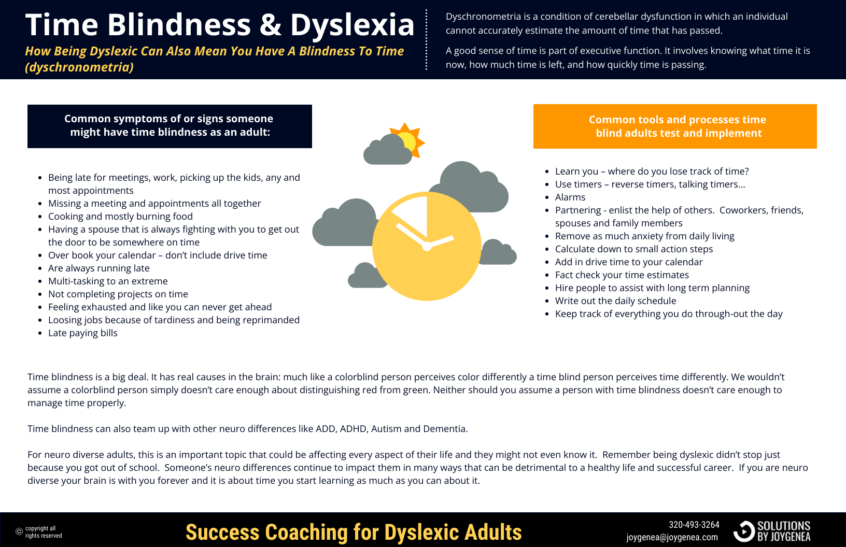Time blindness and dyslexia are no uncommon. I recently wrote in detail about it. DYSLEXIA & TIME BLINDNESS – HOW BEING DYSLEXIC CAN ALSO MEAN YOU HAVE A BLINDNESS TO TIME (DYSCHRONOMETRIA)
If you are anything like me though, you enjoy a good infographic with the details simplified. This page is for us.
Here is a link to a printable PDF – LINK TO PDF
Dyschronometria is a condition of cerebellar dysfunction in which an individual cannot accurately estimate the amount of time that has passed.
Common symptoms of or signs someone might have time blindness as an adult:
- Being late for meetings, work, picking up the kids, any and most appointments
- Missing a meeting and appointments all together
- Cooking and mostly burning food
- Having a spouse that is always fighting with you to get out the door to be somewhere on time
- Over book your calendar – don’t include drive time
- Are always running late
- Multi-tasking to an extreme
- Not completing projects on time
- Feeling exhausted and like you can never get ahead
- Losing jobs because of tardiness and being reprimanded
- Late paying bills
Time blindness is a big deal. It has real causes in the brain: much like a colorblind person perceives color differently a time blind person perceives time differently. We wouldn’t assume a colorblind person simply doesn’t care enough about distinguishing red from green. Neither should you assume a person with time blindness doesn’t care enough to manage time properly.
Time blindness can also team up with other neuro differences like ADD, ADHD, Autism and Dementia.
Things to try
- Learn you – where do you lose track of time?
- Use timers – reverse timers, talking timers…
- Alarms
- Partnering – enlist the help of others. Coworkers, friends, spouses and family members.
- Remove as much anxiety from daily living
- Calculate down to small action steps
- Add in drive time to your calendar
- Fact checks your time estimates
- Hire people to assist with long term planning
For neuro diverse adults, this is an important topic that could be affecting every aspect of their lives and they might not even know it. Remember being dyslexic didn’t stop just because you got out of school. Someone’s neuro differences continue to impact them in many ways that can be detrimental to a healthy life and successful career. If you are neuro diverse your brain is with you forever and it is about time you start learning as much as you can about it.
Enjoy the journey and get to know your brain,
JoyGenea Schumer
Business Owner, International Neurodiversity Coach and Speaker
